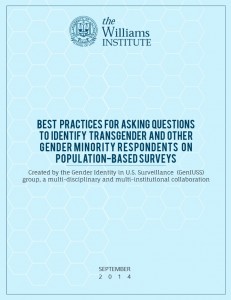A new report released last week by the Gender Identity in U.S. Surveillance (GenIUSS) group highlights the lack of survey measures to identify transgender and other gender minority respondents in most federally-supported population-based surveys.
This groundbreaking report, entitled Best Practices for Asking Questions to Identify Transgender and Other Gender Minority Respondents on Population-Based Surveys, examines current practices in population-based surveys to see which surveys currently include measures to identify transgender and other gender minority respondents and offers expert recommendations for including sex and gender-related measures in population-based surveys.
“As an LGBTQ community funder, a longtime transgender advocate, and a member of the GenIUSS group, these best practices provide strong opportunities for capturing the experiences of transgender youth, adults, and families in population based surveys, but can also be adapted to fit statewide, local, and other organizations that we support in reflecting all of their constituents,” said Gunner Scott, Director of Programs at Pride Foundation.
The report offers best practices for identifying transgender and other gender minority respondents in population-based surveys. Among the best practices delineated in the report, the most effective is the “two-step” approach. This practice includes measures of self-reported assigned sex at birth (the birth recorded on one’s original birth certificate) and gender identity at the time of the survey.
There are also recommendations on the best way to place and integrate sex and gender-related measures into population-based surveys in this report.
Among the federally supported population-based surveys that currently do not include measures to identify gender minority respondents are the American Community Survey, the Current Population Survey, and the National Health Interview Survey, and others.
Click here for additional information on the report, including a list of contributing partners.
